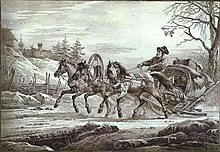
A kibitka (Russian: кибитка, from the Arabic kubbat, 'dome') is a pastoralist yurt of late-19th-century Kyrgyz and Kazakh nomads. The word also refers to a Russian type of carriage or sleigh.


The kibitka uses the same equipage as the troika but, unlike the troika, is larger and usually closed. In Russian literature and folklore, kibitka is a term used mainly for Gypsy wagons. During the Russian Empire, its use to deport disgraced noblemen led to the German-language term kibitkenjustiz ('kibitka justice').
See also
- Other horse-drawn vehicles of Russia:
- Horses in Russia
Sources
- "Toponymy of the Ancient Sary-Arka (North-Eastern Kazakhstan)".
- Kibitka Meyers Großes Konversations-Lexikon, vol. 10, Leipzig 1907, p. 880, in German.
- Kibitka Meyers Großes Konversations-Lexikon, vol. 10, Leipzig 1907, p. 880, in German - "Auf solchen Kibitken wurden früher mißliebige Standespersonen in die Länder am Ural gebracht, daher der Ausdruck Kibitkenjustiz."
This equine-related article is a stub. You can help Misplaced Pages by expanding it. |